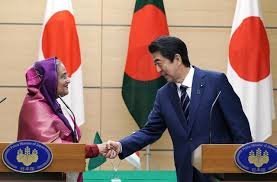Bangladeshi leader visits Japan to talk economy, partnership

Tokyo: Bangladeshi Prime Minister Sheikh Hasina is wooing Japan for aid, trade and investment in a visit that highlights cordial relations with the administration of Prime Minister Shinzo Abe.
Hasina, who is beginning a third consecutive five-year term, arrived late Tuesday and is set to meet Abe and hold a joint news conference Wednesday. A dinner is also being held in her honour.
The leaders will discuss the Bay of Bengal development project and strengthening economic and security partnerships, according to the Japanese Foreign Ministry.
Japan has been weary of the security and economic threat of neighboring China and has been courting other nations in Asia as well as the U.S. and Europe.
This week alone, Abe is meeting with leaders of the Philippines, Cambodia, Malaysia, Vietnam, Singapore and Laos in addition to Bangladesh. He just finished playing host to a four-day visit by President Donald Trump, which ended Tuesday.
Hasina has visited five times before, as prime minister and opposition leader, but this marks her first visit since taking office in her latest term.
Promoting trade between Japan and Bangladesh is important for both sides, with Bangladesh importing mostly steel, autos and machinery from Bangladesh, and Japan importing clothing products and jute.
Japanese imports from Bangladesh have quadrupled recently compared to 2009 levels. Japanese companies setting shop in Bangladesh are also growing, mostly in textiles and manufacturing.
Japan has long seen Bangladesh as a key partner because Bangladesh has supported Tokyo's wish to become a permanent member of the U.N. Security Council, as well as backed its position on nuclear weapons.
Hasina won an overwhelming victory in the December elections. The opposition alliance is demanding new elections, saying the polls were rigged, an allegation the Election Commission and Hasina have rejected.
More than a dozen people were killed in election-related violence on the day of the polls, and the election campaign was undermined by allegations of arrests and the jailing of thousands of Hasina's opponents. Authorities said the arrests and the jailing were not politically motivated.















































